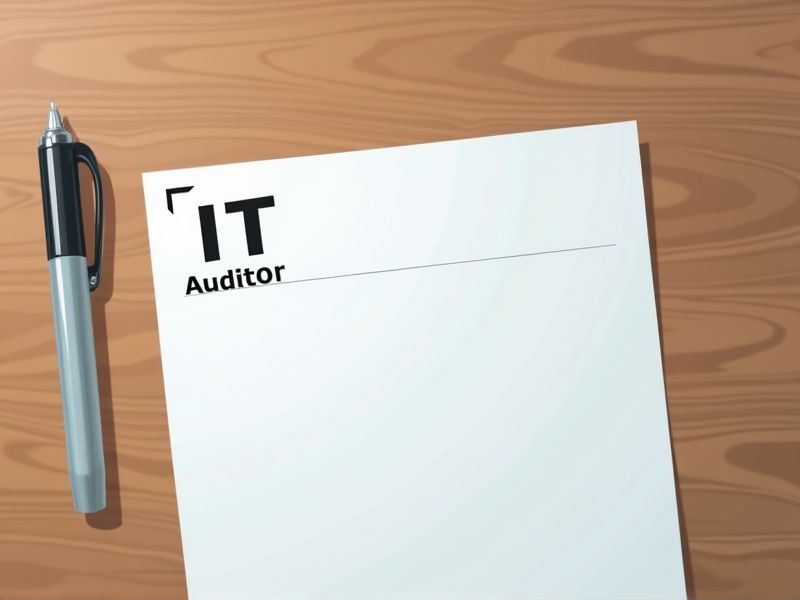
Organizations increasingly rely on IT auditors to ensure data integrity, compliance with regulations, and the efficiency of IT systems. Obtaining specific certifications enhances an auditor's credibility and equips them with the best practices and technical skills needed to identify vulnerabilities and deliver actionable insights. Certifications also demonstrate a commitment to continuous learning and staying updated on rapidly-evolving technologies and standards. Below are key certifications that IT auditors should consider.
Certified Information Systems Auditor (CISA)
CISA certification signals a thorough understanding of auditing, control, and security of information systems, enhancing an IT auditor's credibility and competence. Employers value CISA because it ensures the auditor possesses up-to-date knowledge of industry standards and practices. The certification process requires ongoing education and professional development, ensuring the auditor stays current with evolving technologies and threats. Possessing CISA often results in career advancement opportunities and higher earning potential within the IT audit field.
Certified Information Security Manager (CISM)
A CISM certification equips IT auditors with a deeper understanding of information security governance, enhancing their ability to evaluate and improve an organization's security policies and procedures. This certification provides IT auditors with a comprehensive knowledge of risk management, enabling them to accurately assess potential threats and vulnerabilities. CISM enhances an auditor's credibility and demonstrates a commitment to ongoing professional development in the rapidly evolving cybersecurity landscape. Organizations seeking to defend against complex security challenges rely on auditors with CISM certification to ensure robust protection mechanisms are in place.
Certified Information Systems Security Professional (CISSP)
The role of IT Auditor requires a comprehensive understanding of security practices, and CISSP provides this expertise by covering essential topics like risk management, security architecture, and access control. The certification ensures that IT Auditors possess up-to-date knowledge of cybersecurity threats and defense mechanisms vital for protecting sensitive information. Employers often seek IT Auditors with CISSP credentials to validate their ability to align security practices with organizational goals. Possessing a CISSP enhances credibility and career prospects, assuring employers of an auditor's competence in addressing complex security challenges.
Certified in Risk and Information Systems Control (CRISC)
Organizations increasingly rely on IT Auditors to identify and mitigate information system risks; holding a CRISC certification equips auditors with the knowledge to manage these risks effectively. Possessing CRISC enhances an IT Auditor's ability to understand and establish robust risk management practices, aligning technology with business strategies. CRISC-certified professionals are recognized for their proficiency in identifying vulnerabilities, which directly reduces the likelihood of data breaches and compliance failures. With the growing complexity of information systems, CRISC ensures IT Auditors are up-to-date with the latest governance and risk management trends.
Certified in the Governance of Enterprise IT (CGEIT)
Obtaining the Certified in the Governance of Enterprise IT (CGEIT) credential equips IT Auditors with the essential knowledge to evaluate and improve IT governance frameworks. As enterprises increasingly depend on IT systems, having a professional with CGEIT certification ensures alignment between IT initiatives and organizational goals. This certification provides a comprehensive understanding of risk management practices, which is crucial for identifying potential vulnerabilities. Employers value CGEIT-certified auditors as they bring proven credibility and expertise in overseeing enterprise IT governance.
CompTIA Security+
CompTIA Security+ establishes foundational security knowledge, which is essential for IT Auditors to evaluate and ensure the security of information systems. It covers critical topics such as risk management, which aids auditors in identifying and prioritizing vulnerabilities effectively. The certification demonstrates a standardized level of expertise that employers value and trust in their audit professionals. Familiarity with best security practices enables IT auditors to provide informed and reliable assessments.
Certified Internal Auditor (CIA)
An IT auditor with the Certified Internal Auditor (CIA) designation gains a comprehensive understanding of internal auditing standards, which enhances their ability to evaluate IT controls effectively. Possessing the CIA credential ensures the IT auditor adheres to ethical practices, crucial for maintaining trust in digital environments. The CIA certification equips an IT auditor with the skills necessary to identify and mitigate risks, improving organizational security and data integrity. Organizations often prefer IT auditors with the CIA designation, as it signifies a commitment to continuous professional improvement and adherence to globally recognized auditing practices.
ISO/IEC 27001 Lead Auditor
Obtaining the ISO/IEC 27001 Lead Auditor certification equips IT auditors with specialized knowledge in information security management, essential for assessing organization's compliance with international standards. This certification enhances an auditor's ability to identify vulnerabilities and recommend effective control measures, directly impacting an organization's security posture. The expertise gained aids in conducting more thorough audits, ensuring that information security risks are mitigated comprehensively. Organizations increasingly value this certification, indirectly boosting an IT auditor's career prospects and credibility in the field.
CompTIA Cybersecurity Analyst (CySA+)
The CompTIA Cybersecurity Analyst (CySA+) provides IT auditors with crucial skills to identify and analyze threats, which enhances their ability to evaluate an organization's security measures effectively. By understanding threat detection and response, IT auditors can offer more informed recommendations on improving cybersecurity protocols. The CySA+ certification emphasizes hands-on skills in configuring and using threat detection tools, a vital competency for IT auditors assessing security vulnerabilities. As cyber threats continue to evolve, auditors with CySA+ credentials bring updated expertise to the identification and mitigation of these risks.
GIAC Security Essentials (GSEC)
The GSEC certification equips IT auditors with a thorough understanding of information security principles and practices, which strengthens their ability to assess security protocols effectively. Possessing GSEC credentials enhances an auditor's credibility in reviewing cybersecurity frameworks, as it demonstrates specialized expertise in security essentials. By understanding various security configurations and network systems, IT auditors can identify vulnerabilities and compliance issues more accurately. The certification provides practical knowledge, crucial for auditors to recommend enhancements to an organization's security posture, leading to more robust protection against threats.
Summary
With certifications, you can enhance your credibility and knowledge in IT auditing. This credibility often leads to increased job opportunities and potential salary hikes. Your proficiency in identifying risks and implementing controls is likely to improve. Enhanced skills can contribute to better decision-making and increased trust from stakeholders.
